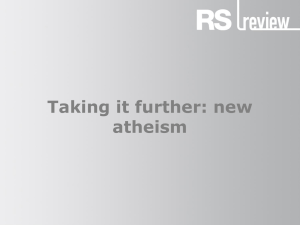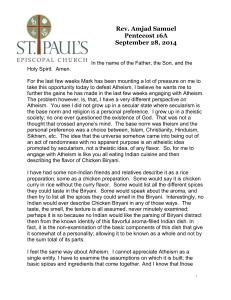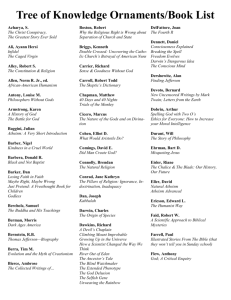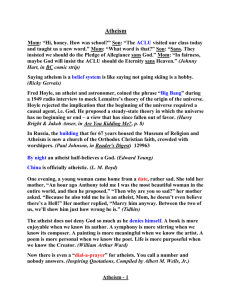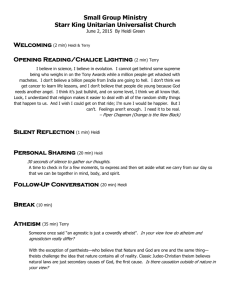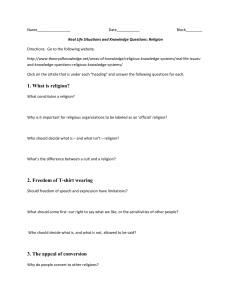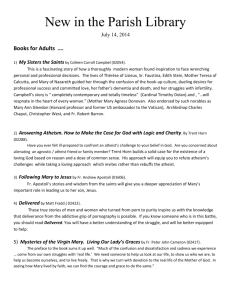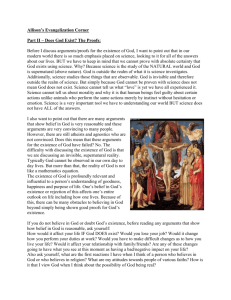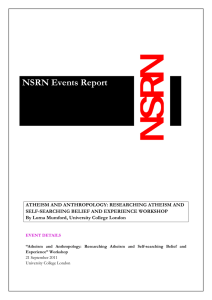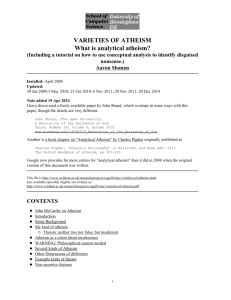Three Questions on Modern Atheism: An Interview with John Milbank
advertisement
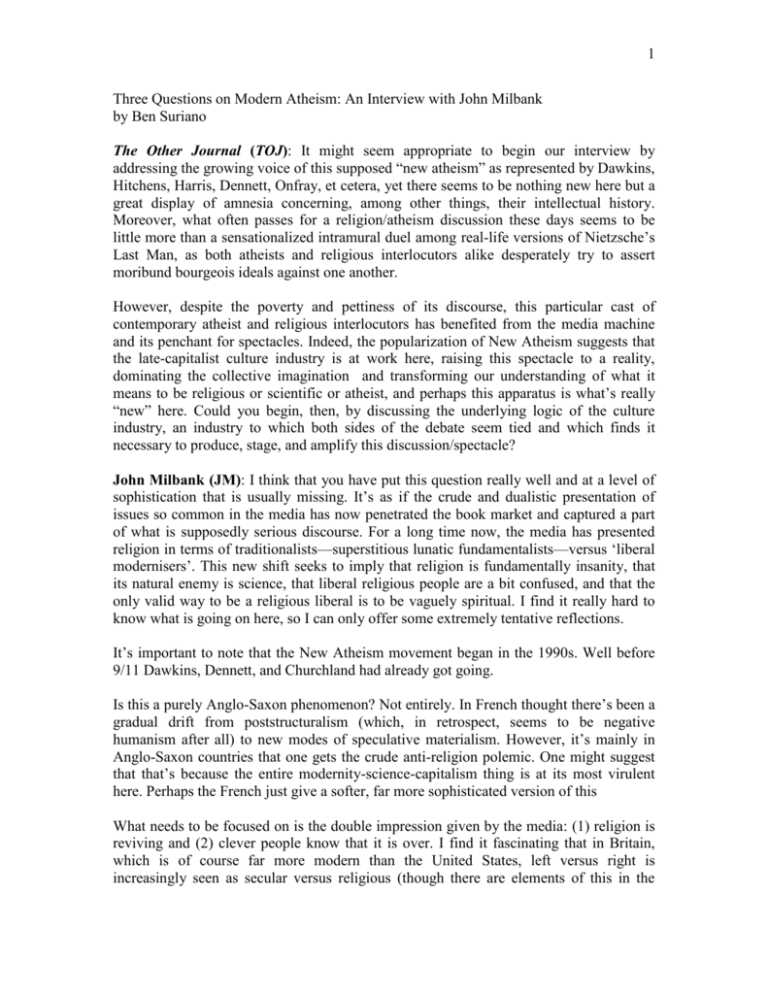
1 Three Questions on Modern Atheism: An Interview with John Milbank by Ben Suriano The Other Journal (TOJ): It might seem appropriate to begin our interview by addressing the growing voice of this supposed “new atheism” as represented by Dawkins, Hitchens, Harris, Dennett, Onfray, et cetera, yet there seems to be nothing new here but a great display of amnesia concerning, among other things, their intellectual history. Moreover, what often passes for a religion/atheism discussion these days seems to be little more than a sensationalized intramural duel among real-life versions of Nietzsche’s Last Man, as both atheists and religious interlocutors alike desperately try to assert moribund bourgeois ideals against one another. However, despite the poverty and pettiness of its discourse, this particular cast of contemporary atheist and religious interlocutors has benefited from the media machine and its penchant for spectacles. Indeed, the popularization of New Atheism suggests that the late-capitalist culture industry is at work here, raising this spectacle to a reality, dominating the collective imagination and transforming our understanding of what it means to be religious or scientific or atheist, and perhaps this apparatus is what’s really “new” here. Could you begin, then, by discussing the underlying logic of the culture industry, an industry to which both sides of the debate seem tied and which finds it necessary to produce, stage, and amplify this discussion/spectacle? John Milbank (JM): I think that you have put this question really well and at a level of sophistication that is usually missing. It’s as if the crude and dualistic presentation of issues so common in the media has now penetrated the book market and captured a part of what is supposedly serious discourse. For a long time now, the media has presented religion in terms of traditionalists—superstitious lunatic fundamentalists—versus ‘liberal modernisers’. This new shift seeks to imply that religion is fundamentally insanity, that its natural enemy is science, that liberal religious people are a bit confused, and that the only valid way to be a religious liberal is to be vaguely spiritual. I find it really hard to know what is going on here, so I can only offer some extremely tentative reflections. It’s important to note that the New Atheism movement began in the 1990s. Well before 9/11 Dawkins, Dennett, and Churchland had already got going. Is this a purely Anglo-Saxon phenomenon? Not entirely. In French thought there’s been a gradual drift from poststructuralism (which, in retrospect, seems to be negative humanism after all) to new modes of speculative materialism. However, it’s mainly in Anglo-Saxon countries that one gets the crude anti-religion polemic. One might suggest that that’s because the entire modernity-science-capitalism thing is at its most virulent here. Perhaps the French just give a softer, far more sophisticated version of this What needs to be focused on is the double impression given by the media: (1) religion is reviving and (2) clever people know that it is over. I find it fascinating that in Britain, which is of course far more modern than the United States, left versus right is increasingly seen as secular versus religious (though there are elements of this in the 2 States). This is despite their recent history of conspicuously religious “left” political leaders. One sees this phenomenon in the 2008 Parliament debate over an embryology bill. The press presented the debate as left versus right, science versus religion, et cetera and wrote naively as if science answered moral questions. But in reality, while the majority left members of Parliament supported experimentation on embryos, the fact that by no means all of them did so was, so to speak, hushed up. Increasingly, the media do not want complex stories, and they therefore make us live by this dualistic approach. Yes, the spectacle of “science” is now regarded an absolute destiny. It is the human glory to undo itself through science. British police shows like Waking the Dead now screen very long takes of the dissection of human bodies by glamorous women. The message is that science is beautiful and glossy, that finding scientific truth is the one moral impulse, and that human life is otherwise a tragic mess. Dawkins and his cohorts want the supposed incompatibility of science with religious belief to be taught as an official part of a state agenda. This is tantamount to a revival of Soviet-style official atheism. It would mean that the obvious ‘debatability’ of this view would be denied and free speech would therefore be denied to one side of the debate. Religious people as declaredly ‘anti-science’ would inevitably become second-class citizens. But I’m not arguing on ‘liberal’ ground s here for the equality of all and every opinion. I’m rather suggesting that some issues have to be publicly regarded as ‘debatable’ even though on stands on one side or another. Hence I would argue that it is ‘radically irrational’ to suppose that people who think religion and science are compatible are ‘obviously stupid’. But I would also argue the reverse. People who think they are incompatible are in my view mistaken and not subtle thinkers but I can see how they have made this mistake for apparently plausible sounding reasons. There is no need to marginalise them as lunatics – though the case for doing so would be far rationally stronger than the case for marginalising religious people. What’s this new scientistic fanatacism all about? Well, I suppose it is fundamentally about the collapse of all secular ideologies in the late twentieth century. One is left with the truth of science as the only reality of the modern. If science is simply the freedom to know, it can become Faustian. And apart from this freedom there is only the right to choose one’s own lifestyle. The crucial thing here that the left has missed here is that sexual freedoms have increased exponentially while all other freedoms have declined. Today in Great Britain, you scarcely have the right to demonstrate, and a higher proportion of Great Britain’s population is in prison than the proportion of China’s population that is in prison. The boy at the shopcounter with no customers is not allowed to read a book to improve himself, but who cares what he gets up to with sex and drink after the shop closes? Of course, there’s also a double-think about sex—it’s all OK and yet male sexuality is nearly always exploitative, etcetera—but in general, it would seem that, as Adorno and Horkheimer and Marcuse predicted, sexualization is intended to keep us all quiet: neurotic, hysterical, frustrated, and unhappy but still “looking.” Knowing that 3 we they can watch a porn film when they get home from work, workers may overlook the fact that they have lost the lunch-hour when they could have caught up with public affairs over a sandwich in the local library. Thus with sex divided from procreation, science and sexual freedom come together in a tacit Malthusian programme of biopolitical manipulation. The State aspires both scientifically to control reproduction and to keep its citizens ‘drugged’ with dreams of sex and the need to compete in the sexual agon. Michel Houillebecq is completely right about this and the left has to rethink its 60’s-derived libertarianism if it wishes to continue to oppose capitalism. Instead, by supporting the total disjuncture of sex and procreation, the left is really supporting a new mode of fascism. “Women” are lined up with science and choice in order to produce a new kind of ideal human subjectivity—male and autonomous and yet pliant in a “female” manner. The re-envisaged autonomous female body is the final site of the coming together of scientific objectivity and absolute freedom of choice. Perhaps one could even speak here of a new racism of the human race as such—it’s to be made the object of an endless “objective” improvement and the expression of a will to freedom/will to power. Of course, this also means that the specific phenomenology of the female body is destroyed. It’s denied that this body is inherently linked both to the male body (as also vice versa) and to another body that is itself and yet becomes not itself—the baby. Having denied the link of babies to men and also to women, save as objects of their (“male”) choice, babies thereby become pure consumer objects, and all human relationality and personhood is abandoned. After the collapse of secular ideologies then, one is left with “just science.” But also, of course, “the return of religion,” since these now represent the only alternative ideologies—virulent in the case of Islam where religion is still overwhelmingly practiced. Post-9/11 has allowed the media to present the religion-versus-science story in ever cruder terms. Of course, it’s highly significant that Christopher Hitchens also supported the Bush foreign policy. This is because, at bottom, neo-liberalism and scientism line up with each other. But Hitchens never really explains how his imperialism of reason relates to the messianic aspect of American imperialism. He and others don’t explore the point at which fundamentalism and scientism can be in a hidden alliance in that the very emptiness of a formalist approach to economics and politics can allow an extreme religiosity to supply the concrete content. Racist and nationalist fascism can no longer do this very readily because races are mixed up and national identities are confused—so one is getting regionalism as much as nationalism. Religions by contrast supply diffused globalized identities so that religious extremism fits well with an era of globalization. Yet so also does naturalism, the idea that all we have in common is one material planet and our physical nature. Hence, the age of religious and philosophical “agnosticism” is over—as Quentin Meillassoux says. Now we have two rival dogmatisms about the infinite, materialism and fundamentalism. 4 Instead of these dire alternatives, we need more apophatic (though not agnostic) approaches to the infinite; we need to recognize that, as Charles Taylor says, many people embrace a complex mix of belief and unbelief, and as … Pope Benedict XVI advocates, we need more subtle mixes of faith and reason. But the only way our media would recognize this complexity is if we were not dominated by capitalism in the mode of the spectacle. TOJ: In considering the historical development of modern atheism’s cultural logic, what would you consider as its defining cultural form, if there is such a thing? That is, what has been continuously present throughout its modern history? Moreover, what key shifts in the way that power was constructed, distributed, and organized, especially through changing socioeconomic formations, might have provided the necessary material conditions for its emergence and particular shape? JM: I think that we’ve scarcely begun to pose, much less explore, this all-important question. How is it that atheism arose so recently—at the end of eighteenth century—and yet so quickly established itself? Clearly, it began as an elite phenomenon, so it is from the start and up to now socially connected to the idea of a new, rival elite opposed to the old aristocracy. This means that it has to be considered a bourgeois phenomenon or else one of decadent aristocracy—which is another modern socialising mode. I think that Charles Taylor in A Secular Age provides important clues by saying that the atheist self is the “buffered self”—no external spiritual forces can get to it—and also that it is a self that is entirely in charge of its own morality and self-disciplining. Thus, as he argues, if Latin Christianity, because of its over-disciplinary mode and its “festive” deficit, ushered in this sort of self, atheism finally dispenses with the religious bit altogether. This atheist self is definitely the self that is totally autonomous and so it likes to reduce everything to predictable calculation. Spiritual security and worldly freedom and comfort are preferred over the aristocratic heroism of a quest for meaning. In Great Britain, even up to, say, Thatcher or even Blair, the establishment was still somewhat religious. But Blair, ironically, ushered in a new political class that saw politics like a business that is to be exploited, and this political class is essentially an atheist class. Maybe the explicit personal religiosity of the New Labour party in some way worked ideologically to mask this. To my mind then, modernity is liberalism, liberalism is capitalism—“political economy”—and capitalism is atheism and nihilism. Not to see this, or rather not fully to see this, is the critical deficit of Marxism. Again, Taylor is right: All critical resistance to modernity is “romantic’’ in character. It (1) allows that more freedom and material happiness is a partial good, (2) yearns for elements of lost organic values, and (3) realizes that the anti-body, anti-festivity, anti-sex, hell-linked, disciplinary, over-organized character of Latin Christendom is ironically responsible for the Enlightenment mentality. 5 I’m starting to think that this triple romanticism is more fundamental than [any] left/right characterization, which after all, is a kind of accidental result of the French Revolution. Both left and right, as André de Muralt argues in L’unite de la philosophie politique, are nominalist: Both favor a strong, single center of money or power or both (right) or the rights of the many singly or when totted up (left). Both positions are also in the end atheist. It is also important now to re-read carefully Karl Polanyi’s The Great Transformation, arguably the most important work of political economy written in the last century. Although it is a socialist work, which indeed goes rigorously beyond Marx’s ontology and history of capitalism from a ‘religious’, guild-socialist perspective, it is also suspicious of most socialisms – state socialism certainly, but also many associative socialisms which he notably tracks back to late 17thC Quaker thought, because he sees these as all too akin to capitalist attempts to make indigency and impoverishment a paradoxical source of wealth. Instead, he favours both wide distribution of assets (like Chesterton and Belloc) and a guild-restriction of market entry which by limiting market competition actually protects market competition from monopoly. This allows ‘reciprocity’ to rule – the primacy of mutual satisfaction of needs. This he argues is the human norm against Adam Smith. And against Hayek he is saying that ‘reciprocity’ is the norm of markets. German ordo-liberalism or ‘social market’ theory has often said the same thing. Maurice Glasmann in Afflicted Powers has shown how the British left has misunderstood his current and how close it is to both Polanyi and to Catholic Social teaching. One can also note in passing that Polanyi praises Archbishop Laud and condemns the Cromwellian commonwealth with respect to their treatment of the poor! It is a Catholic not a Protestant socialism that he points us towards............................ We need, indeed a new kind of romantic politics that is specifically religious, and often Christian, in thinking that one can only get distributive equality on the basis of agreed upon values and an elite transmission and guarding of those values. A more Carlylean and Ruskinian politics then—basically left, yet with elements that are not really right so much as pre-modern and traditionalist. Strictly speaking, the pre-modern predates right versus left. In Great Britain, Phillip Blond is developing a crucially important new mode of Red Toryism, which might in my view be seen as a kind of traditionalist socialism. This is already having a profoundly transformative effect upon British politics and, in effect, marks the political translation of the paradox of Radical Orthodoxy and the beginning of its entry upon the political stage. RT is also rapidly acquiring a global influence. Others have been speaking of a ‘blue socialism’ (myself ) or of ‘blue labour’ (Maurice Glasmann, a Polanyist Jewish Socialist and Jon Cruddas a prominent labour MP). However, I would argue that the paradox amounts to the same thing whatever way round one puts it. Blond draws upon genuine traditions of ‘Tory radicalism’ (Richard Oastler etc) but in fact RT goes well beyond that. It stakes out a new radical communitarian ground against the liberalism of both right and left. The hard thing now for critical thinkers to do is to think outside leftism. They have to see that if neo-liberalism and neo-conservatism have totally triumphed, this is because the left in its traditional mode is incapable of carrying out an adequate critique of capitalism. 6 In the end, this is because it’s atheistic—one needs to be religious to recognize objective values and meanings as not just epiphenomenal. Again Polanyi clearly saw that capitalist ‘primary accumulation’ is always also an act of descralisation. Today in Great Britain, the left is more or less now defining itself as scientistic which actually permits an underwriting of a new mode of fascism and racism as I mentioned earlier. Left Christians now must stress the Christian bit much more if they are truly going to be able to make a critical intervention. Atheism is bourgeois oppression; atheism is the opium of the people—it claims to discover an ontology that precludes all hope. In the face of this we need now to celebrate the faithful legacy of peasants; learned, honorable and genuinely paternalist aristocrats, Christian warrior kings like Alfred the Great and Charles Martel; yeomen farmers and self-sacrificial scholars. Charles Péguy, William Cobbett and Hilaire Belloc are the men for the hour. TOJ: How might we understand the key intellectual shifts that both made possible and legitimated the changes in the organization of power that contributed to the rise of modern atheism? Moreover, in light of the common readings of atheism as essentially negative—as a sober desacralizing, disenchanting, and demythologizing movement— how should we understand the intellectual shifts of modern atheism in relation to Christian theology? Did atheism’s intellectual development come by way of a thorough rejection of theology, as common readings claim, or more primarily as the construction of an alternative theology? JM: Again, this is to ask absolutely the right question. Many authors, like Michael Buckley, have now shown that atheism was not “subtractive.” In the face of a decadent late-Baroque theology, it had positively to invent a self-sufficient naturalism, or else new modes of theism were invented. Often, indeed, atheism has operated as a religion—of nature, of man, of race, of class destiny—and now it’s becoming the religion of science— democracy is supposed to produce an obedient seconding of the verdicts of science, which are seen as answering all problems, even ethical ones. Charles Taylor has now extended the anti-subtraction theory into the social realm. The very idea of social and political order without religion is bizarre by all traditional lights. The invention of secular order is an extraordinary achievement, if not highly questionable, because instead of faith, it requires rational foundations that one really can’t have. Thus, practical atheism is more dogmatic than religion. I’d add to Taylor a bigger stress on the dubiousness of liberalism, which is mainly political economy. As Pierre Manent argues in his Intellectual History of Liberalism it “empties the soul”—it delivers negative freedom at the price of a loss of character. We’re now at a crossroads. Politics has become a shadow play. In reality, economic and cultural liberalism go together and increase together. The left has won the cultural war, 7 and the right has won the economic war. But of course, they are really both on the same side. The point is to resist this. And that means, of course, to re-think Christendom, but in more festive, pro-body terms, yet more interpersonal, less fearing terms, and terms that celebrate much more excellence and virtue in every realm, including those of craft, farming, and trade, and to re-think Christendom with greater will to the democratization of excellence. The “other religions” thing in the end won’t matter. The world as a whole is rapidly Christianizing, and even in Islamic countries like Bangladesh Muslims are finding their own specific and valuably Islamic way to Christ in notably increasing numbers. As Paul Claudel realised in Le Soulier de Satin, the meaning of globalisation is a shift to the primacy of the sea, la mer tout entière, and so figurally of baptism and personal relationship, however terrestrially sundered. The evil disasters of colonialism can only be redeemed when they are seen as perverse and yet providential ways to the further proclamation of Christian universalism. But the challenge now is to have a good and true and not a perverted capitalist version of a global Christendom.

